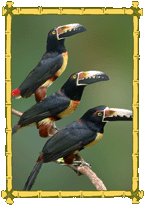|
|
More Free Advice: Toucan Recipes The best bit of personal advice I am going to give you is this: All toucans taste the same. If you’ve just begun to explore the world of toucan husbandry, you’ll soon discover few breeders agree on the best “recipe” for success. As you might expect, each argues their own “recipe” has produced the birds you need to start your own flock. Eventually, as you sort through these rival “recipes”, you’ll have to make a few decisions; you’ll have to decide what difference you believe really exists between toucans that are:
Few of the distinctions above are more than thirty years old. All came into use after 1975 when bird importers were forced to become bird breeders by the international regulation of the pet trade (see What is CITES?). Thirty years ago, no one had experience breeding toucans, no one had a “recipe” for toucan husbandry. In fact, all AFA first-breeding awards for toucans were given to breeders with the same luck you’ll have – beginner’s luck. I’ll be happy to talk with you about any of the “recipes” you’ve heard are best. I’ll be happy to talk with you about anything. But I’ll tell you now that what you’ve heard is never as important as who told you. And as for who to trust in aviculture, you are, unfortunately, faced with a dilemma even more perplexing than that described by this riddle:
Good luck! David Foley • 407 721-6132 • |
